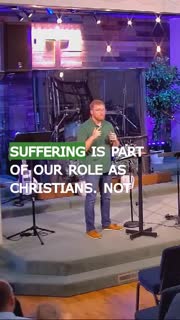Living Worthy of the Gospel: Faith and Suffering
Devotional
Sermon Summary
Bible Study Guide
Sermon Clips
1. "Paul is saying these things. He's saying that it would be much better to depart and to be with God in the heavens, where there is no pain, there is no burdens, there is no sorrows, where Jesus will walk alongside us and wipe every tear from our eyes. We worship God forever and ever. Amen. But he says in the meanwhile, he says to live is Christ, to die is gain." [47:46] (23 seconds)
2. "Paul says he knows that this is going to be a long period of suffering for him, but it's going to be of benefit to the Philippians. And for that reason, he will continue to persevere. That has to be a great encouragement to the Philippians, but that's not where we're stopping today. For he continues with verse 27. He says only with all this in mind, knowing that to live is Christ and to die is gain. He says only live your lives in a manner worthy of the gospel of Christ." [49:14] (32 seconds)
3. "We can live in an honorable way. We can be pleasant. It goes a long way. I didn't have anybody throwing things at me when my daughter was screaming, so that's a good step in the right direction. We can live honorably. We can look at the duty that we have been prescribed through the gospel. First and foremost, knowing Jesus as Savior. Secondly, expressing that to others as an example of hope and of peace and of generosity and of grace and of love." [52:02] (26 seconds)
4. "It prescribes faithfulness, first and foremost. That we will be faithful to know God as Father. That we will be faithful to evangelize, faithful to a disciple, faithful to take on the burdens as a sacrifice of ourselves. Secondly, it prescribes fruitfulness. It prescribes that if we are pursuing Christ, we will be fruitful for Him. It does not prescribe that we will bear fruit for ourselves unless it is the will of God, but it prescribes that we will utilize our fruitfulness for His gospel ministry." [53:08] (31 seconds)
5. "Suffering is part of our role as Christians. Not that we would then show others, look at how hard I have it. Look at how broken I am. Feel bad for me. But rather, so we can encourage them with the encouragement that we ourselves have received from the gospel. We would share the hope that we have found. We would share the peace that we have found. And then we would be able to say, even when the hope and the peace aren't right there with us, then we know that He is there with us." [01:03:11] (29 seconds)
6. "We are to take the relationship that we have with Christ. We are to engage in fellowship with those who have relationship, and we are to develop a conviction that's worth fighting for and contending for. And so starting at the beginning of that, if you do not have a relationship with Christ, and I don't mean just a knowledge of Christ, because you can know a lot of great things like physics and algebra, and it goes nowhere. Proof. On the other hand, you can have relationship with Christ." [01:04:45] (28 seconds)
7. "We are called to suffer. We are called to martyrdom. Likewise, we are called to take the relationship that we have, to engage in fellowship with one another, and to continue to show the world what it looks like when God's people stand firm on the foundation of the gospel. And so we take the relationship that we have, we engage in fellowship with those who have it, and we seek to develop a conviction. Conviction leads to something worth contending for." [01:06:19] (28 seconds)
8. "So if you want something that's worth contending for, start with the gospel. Know the gospel. Preach it to yourself daily, every hour. Find yourself meditating in the gospel, and in that way you will live for it, my brothers and sisters. I've never said that before. I just felt fitting because I'm in the country. So we take the relationship. We develop the fellowship. We stand firm on the conviction. We contend for the faith of the gospel, and then we do it again, and again, and again." [01:07:21] (34 seconds)
Ask a question about this sermon
2. "Paul says he knows that this is going to be a long period of suffering for him, but it's going to be of benefit to the Philippians. And for that reason, he will continue to persevere. That has to be a great encouragement to the Philippians, but that's not where we're stopping today. For he continues with verse 27. He says only with all this in mind, knowing that to live is Christ and to die is gain. He says only live your lives in a manner worthy of the gospel of Christ." [49:14] (32 seconds)
3. "We can live in an honorable way. We can be pleasant. It goes a long way. I didn't have anybody throwing things at me when my daughter was screaming, so that's a good step in the right direction. We can live honorably. We can look at the duty that we have been prescribed through the gospel. First and foremost, knowing Jesus as Savior. Secondly, expressing that to others as an example of hope and of peace and of generosity and of grace and of love." [52:02] (26 seconds)
4. "It prescribes faithfulness, first and foremost. That we will be faithful to know God as Father. That we will be faithful to evangelize, faithful to a disciple, faithful to take on the burdens as a sacrifice of ourselves. Secondly, it prescribes fruitfulness. It prescribes that if we are pursuing Christ, we will be fruitful for Him. It does not prescribe that we will bear fruit for ourselves unless it is the will of God, but it prescribes that we will utilize our fruitfulness for His gospel ministry." [53:08] (31 seconds)
5. "Suffering is part of our role as Christians. Not that we would then show others, look at how hard I have it. Look at how broken I am. Feel bad for me. But rather, so we can encourage them with the encouragement that we ourselves have received from the gospel. We would share the hope that we have found. We would share the peace that we have found. And then we would be able to say, even when the hope and the peace aren't right there with us, then we know that He is there with us." [01:03:11] (29 seconds)
6. "We are to take the relationship that we have with Christ. We are to engage in fellowship with those who have relationship, and we are to develop a conviction that's worth fighting for and contending for. And so starting at the beginning of that, if you do not have a relationship with Christ, and I don't mean just a knowledge of Christ, because you can know a lot of great things like physics and algebra, and it goes nowhere. Proof. On the other hand, you can have relationship with Christ." [01:04:45] (28 seconds)
7. "We are called to suffer. We are called to martyrdom. Likewise, we are called to take the relationship that we have, to engage in fellowship with one another, and to continue to show the world what it looks like when God's people stand firm on the foundation of the gospel. And so we take the relationship that we have, we engage in fellowship with those who have it, and we seek to develop a conviction. Conviction leads to something worth contending for." [01:06:19] (28 seconds)
8. "So if you want something that's worth contending for, start with the gospel. Know the gospel. Preach it to yourself daily, every hour. Find yourself meditating in the gospel, and in that way you will live for it, my brothers and sisters. I've never said that before. I just felt fitting because I'm in the country. So we take the relationship. We develop the fellowship. We stand firm on the conviction. We contend for the faith of the gospel, and then we do it again, and again, and again." [01:07:21] (34 seconds)








